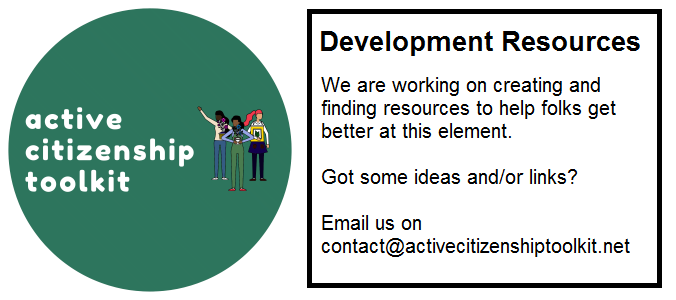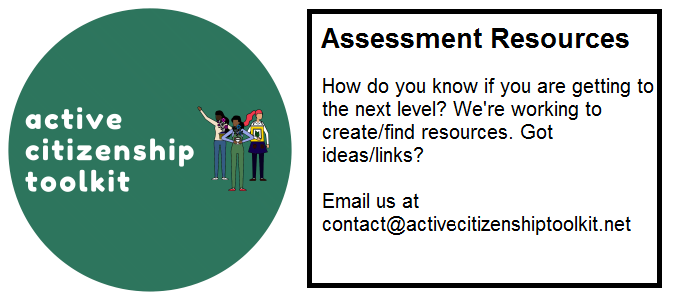Element Descriptor
Anybody who tells you that nobody is “keeping score” in activist groups – about who is doing what, who has what moral authority – is either in the honeymoon phase, not paying attention, or trying to psych you out. Understanding how (self) credibility is gained, maintained is crucial to understanding what does, and does not, get done. Failing to understand this will leave you at best bewildered, at worst prey to the worst sort of con artists and hustlers
Level descriptors
| Novice | Practitioner | Expert | Ninja |
|---|---|---|---|
| You have a basic understanding of the kinds of needs new and established activists have for recognition/validation/position, and you can spot and have compassion for some of the more obvious power plays and hammer holder-looking-for-some-nails dynamics that most normal groups have. | You have a thorough understanding of all but the most arcane psychological needs of most types of people involved in ‘activism’, how these display, what tends to happen when access to tokens/status is thwarted/frustrated for whatever reason. You also know how to keep your goddamn mouth shut about it, most of the time. | You have seen them all – all the plays, all the maneuvers, the tanties, the digs, the regressions, hijacks and jostling. You can tell which is coming next just by looking at everyone’s footwear. You can explain these all in simple robust language, and even on your good days help people see better ways of doing things. You don’t get invited to many parties. | You’re just like an expert, except you can do what they do while blindfolded and with headphones blasting out your favourite grunge/grime/opera. While everyone is on best behaviour. In a foreign language. |
Element Overview Essay
This is a draft. If something doesn’t make sense, or you see typos, or if you have further ideas, please email us on contact@activecitizenshiptoolkit.net
So the reasons people don’t understand how activism has an economy around credibility, (the Political Economy of activists credibility)Is that it seems incredibly Daily Mail, right wing cynical, public choice theory to talk about people wanting to have status. It’s the kind of regressive “virtue signalling” smear that you see in the Spectacularly-boring, or The Times for the Torygraph or whatever.
But the consequences of not understanding that there is an economy of credibility – that there is a hidden hierarchy, that there are status games being played, that some voices will be listened to more than others – is that you’re constantly surprised when it turns out that a few people quote, The elders, apparently at Climate Camp 2007 (after my time) running the show, and that their views prevail, and that that famous cartoon from Punch. “That’s a wonderful idea “Miss Triggs, maybe one of the men would like to suggest it “is alive and well in so called non hierarchical settings.
So what is to be done? A dose of honesty, where we talk explicitly about the ways in which tto those that have shall be given. So the people with what Bordieu would call the habitus, cultural capital, are able to deploy that and to ensure that they’re able to come keep deploying that and that at crucial junctures, their perspectives, their emotional needs, their political needs, end up getting foregrounded over and above the actual needs and strategic requirements of a social movement, organisation or social movement.And I would come back again, to a certain meeting in late April 2019 as my touchstone it’s also important to understand that we are as humans are prey to unconscious drives, that this is not an explicit Machiavellian strategy on most occasions.
And we need to have compassion for ourselves and each other. Because we live in a world where we do feel powerless and on our own, we usually are powerless. And the world is going to hell in a handbasket. And people want to create or recreate a sense of agency, in which they can control and they’re doing that, often through hard work. But without understanding that if you’re going to spout about non-hierarchy and transparency and consensus, then you kinda need to walk the walk.
Development Resources

Assessment Resources

